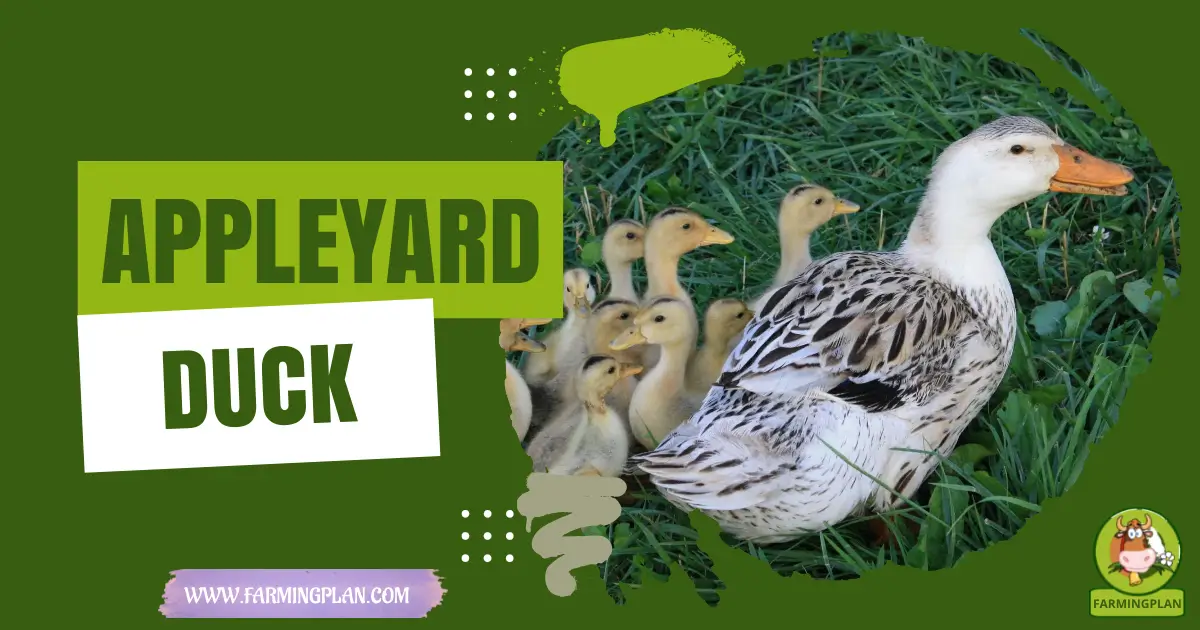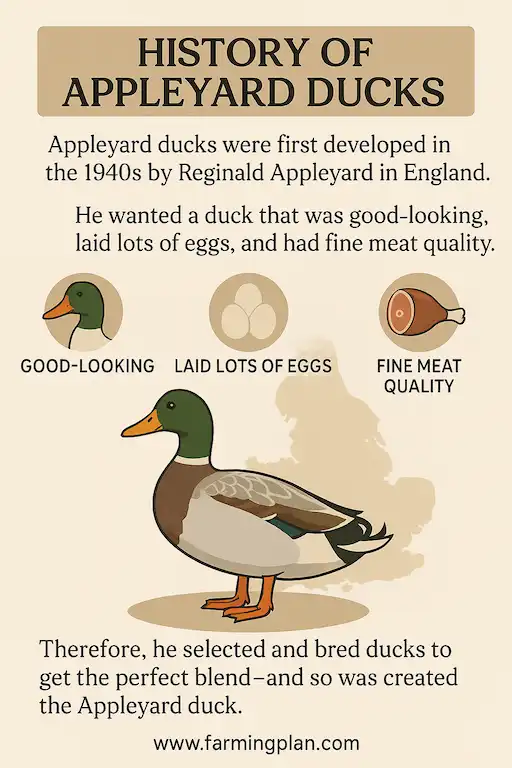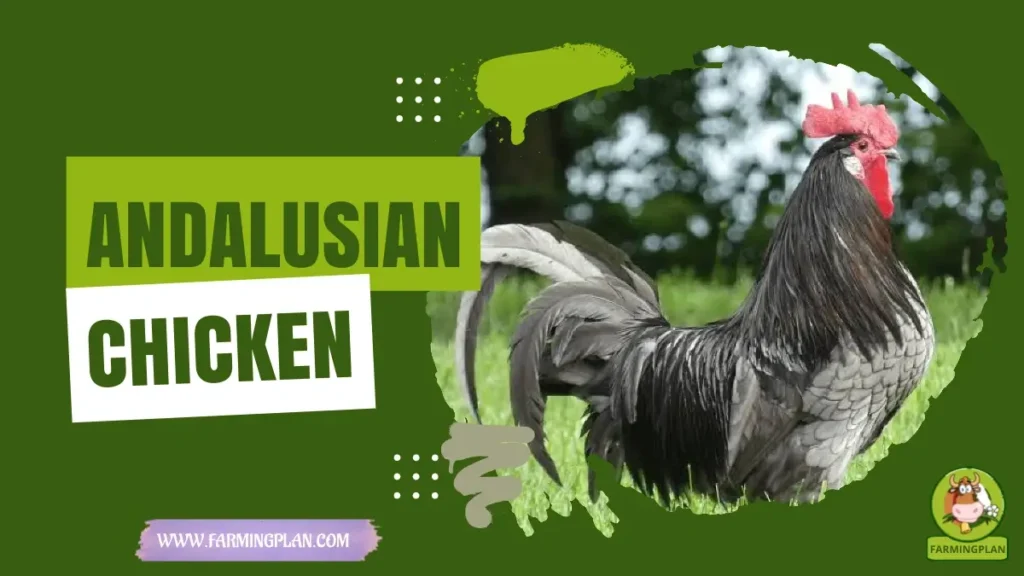If you are drawn to ducks that are both visually stunning and serve a practical purpose, the Appleyard duck will surely be the one that attracts you. Commended for their vibrant plumage and pleasant disposition, these beautiful ducks have won over the hearts of pet lovers, farmers, and duck enthusiasts alike.Whether looking for a reliable source of duck eggs or a top-notch choice for meat production, the Appleyard duck offers both beauty and functionality. Bred to be sturdy, active foragers with lovely personalities, they fit right into family farms and backyard ponds. With a rich history, eye-catching looks, and practical traits, the Appleyard duck is a must-know breed for anyone considering adding a new feathered friend to their life.

History & Origin of Appleyard Ducks

The story of the Appleyard duck begins with a man named Reginald Appleyard. In the early twentieth century, he dreamed of creating the perfect duck—one that was beautiful and a champion at laying eggs and producing meat. Working at his Priory Waterfowl Farm in England, Reginald carefully selected birds that showed the best qualities. His goal was simple: to breed a duck that could be admired for its looks and loved for its usefulness.
By blending strong breeds like runner ducks and mallard-type ducks, Reginald developed what we now call the Silver Appleyard Ducks. These ducks quickly became known for their bright plumage, strong bodies, and friendly nature. Over time, they gained fame across farms, exhibitions, and homes worldwide. Today, the Appleyard duck is considered one of the finest examples of a heavyweight duck class, admired by breeders and pet owners.
Read More: Idegem Duck: Successful Duck Farming
What Is So Special About Appleyard Ducks?

Appleyard ducks are a joy to look at. They shine with silver and white feathers under the sun and possess serene, gentle eyes that are easy to fall in love with. They are medium birds with robust bodies, suitable for small farms or backyards.
One of the most incredible things about Appleyard ducks is that they have such a calm temperament. They are very social and love being around people and other ducks. Most families say they’re great with children because they don’t scare easily and love being petted. You won’t even hear them quacking too much either—they’re pretty quiet and laid-back.
These ducks not only appear wonderful—they also lay lots of eggs! A single Appleyard duck will give you approximately 200 to 270 large white eggs annually. That’s a lot for a duck! They’re good, steady layers, and many farmers choose them due to this. Their beauty, friendly nature and egg-laying quality make Appleyard ducks a first choice among many animal enthusiasts.
“Every Appleyard Duck Brings A Splash Of Joy, A Dash Of Beauty, And A Lifetime Of Gentle Companionship.”
Characteristics of the Appleyard Duck
The Appleyard duck is truly a sight to behold. It is a large, sturdily built duck with a deep, broad chest and a strong, upright stance. These ducks are part of the heavyweight duck class, meaning they are bigger than many other domestic duck breeds. Their beautiful plumage shines with brighter colors than many other ducks, making them a favorite among duck lovers and breeders. Appleyard ducks can live for 8 to 12 years with proper care, providing long-lasting companionship and productivity.
Males, often called drakes, show off a beautiful blue cross-stripe on their wings and a strong lining of breast feathers. Females have a softer but equally attractive coloring. Both have dark toenails, one of the cool little traits people often notice. When fully grown, the adult Appleyard weighs about 8 to 9 pounds, making it one of the best choices for those looking for larger duck breeds. Their sturdy bodies and vibrant looks make them excellent exhibition birds and wonderful additions to any backyard pond or farm flock.
Tip: If you want a colorful duck that turns heads at farm shows, the Appleyard duck is a top pick!
Read More: Forest Duck: Farm Today
Nature & Temperament of the Appleyard Duck
The Appleyard duck isn’t just a sight to behold; it’s also a joy to be around. These ducks are renowned for being affectionate and sociable, prone to enjoying people’s company. Their inquisitive nature and love of exploring things render them active foragers, dashing here and there and busy all day long.
Appleyard ducks are quiet and easy-going, so they are perfect for first-time duck owners and families. They can live happily with other poultry, like chicken or mixed poultry flocks, without causing trouble. Their peaceful nature also makes them ideal for pet lovers looking for a lovely, social bird to add to their backyard. Whether you have a spacious farm or a cozy backyard, Appleyard ducks will adapt well to their environment and bring joy to your life.
Even though they are generally sweet, these ducks are also smart. They quickly learn where their duck house is and will return there at night without much fuss. If you are looking for a pet duck that is hardy, curious, and full of character, the Appleyard duck is an excellent choice.
Food & Diet for Appleyard Ducks
Feeding an Appleyard duck is simple once you know what they love. These ducks are excellent foragers, so they enjoy eating bugs, snails, plants, and small insects they find while exploring. Giving them the chance to roam safely helps keep them healthy and happy.
When it comes to daily feed, a balanced duck pellet or crumble is best. It should be packed with protein and essential nutrients to support their growth, egg production, and strong legs. Fresh greens like lettuce, peas, and spinach are tasty treats they will appreciate. Always ensure they have clean water nearby because ducks need water to help them eat and digest their food correctly.
Avoid feeding them processed human food, sugary snacks, or anything moldy. These can upset their stomach and cause serious health problems. If you raise Appleyard ducklings, start them on a special waterfowl starter feed and slowly move them to adult food as they grow.
Tip: A healthy Appleyard duck starts with a clean water source and a well-balanced diet!
Usage & Purpose of Appleyard Ducks
The Appleyard duck is one of the best choices for people who want a valuable and beautiful bird. It is a dual-purpose domestic duck, which is excellent for egg and meat production. These ducks are strong layers, producing large white eggs regularly throughout the year. A healthy Appleyard can give you a steady supply of delicious duck eggs, making them a favorite for families who love baking or enjoy rich breakfasts.
When it comes to meat, Appleyard ducks grow into gourmet meat birds with deep, whole breasts and tender meat. Because of their excellent quality of meat, they are often called gourmet roasting ducks. This breed is a superb choice for a meat duck that grows fast and tastes fantastic.
Besides farming, Appleyards make lovely pet ducks and exhibition birds. Their bright colors, calm nature, and strong build fit perfectly into shows, farms, or backyard ponds. Whether a first-time duck owner or an experienced farmer, you will enjoy everything this duck offers.
Special Features of the Appleyard Duck
The Appleyard duck stands out from other duck breeds thanks to its many exceptional qualities. One of its most loved features is its beautiful plumage. These ducks have colorful feathers that shine in the sunlight, showing off a lovely pattern that grabs everyone’s attention. Another special feature is their strong, active build. They are robust, active, and strong-legged birds, making them great for farms and backyard flocks. They can easily move around fields and ponds, helping with natural pest control as active foragers.
The Appleyard duck also has a deep, whole breast, which makes it a top choice for people looking for gourmet meat birds. Its deep breast and prominent breasts distinguish it from many other heavyweight ducks. These ducks are also excellent mothers. Many Appleyard females become diligent mothers when raising their family of ducklings. Their instincts help them protect and care for their young very well.
Tip: If you want a strong, colorful duck that shines in beauty and purpose, the Appleyard duck is your perfect match!
Read More: Laplaigne Duck: A Unique and Rare Waterfowl Breed Explained
Health Issues & How to Prevent
While Appleyard ducks are hardy birds, it’s essential to be aware of some common health issues and take steps to keep them healthy. Proper care and prevention can help ensure your ducks live long and happy lives.
Common Health Issues

One common issue in ducks, including the Appleyard breed, is waterfowl diseases like botulism. This condition can occur if ducks are exposed to stagnant water where bacteria thrive. Symptoms include drooping wings and difficulty standing. If you notice these signs, it’s crucial to move your duck to fresh water and contact a vet immediately.
Another issue to watch out for is parasites like mites and lice. Regularly check your ducks for signs of these pests, especially around the feathers and legs. A healthy duck should have clean feathers and dark toenails showing no infection or irritation.
Foot problems can also occur in ducks that spend too much time on hard or rough surfaces. Ensure your ducks have access to soft, grassy areas where they can forage comfortably. Check for cuts or bruises on your feet if you notice limping or swelling.
Prevention Tips
- Provide clean water: Always ensure your ducks have access to fresh water for drinking and cleaning. Stale water can lead to infections or diseases.
- Regular check-ups: Schedule routine visits with a veterinarian specializing in waterfowl care. Regular health checks can help catch issues early.
- Clean their living space: Keep your duck house clean and dry to prevent bacteria and pests from building up. Change bedding regularly and ensure proper ventilation.
Tip: The key to a healthy Appleyard duck is providing a clean, safe environment and paying attention to their diet and behavior!
Step-by-Step Farming/Pet Owner Care Guide
Caring for Appleyard ducks can be a rewarding experience, whether you’re raising them for egg production, meat production, or simply as a pet. Follow these easy steps to ensure your ducks thrive.
1. Setting Up Their Home
Start by setting up a safe, comfortable duck house for your Appleyard ducks. They need a dry, well-ventilated space where they can rest at night. Make sure it’s large enough to allow them to move around freely. A cozy duck house with plenty of space for your family of ducklings will keep them happy and healthy. You can also create a duck tractor or free-range setup where they can forage and roam during the day. Just make sure the area is secure from predators.
2. Providing Food and Water
Ensure your ducks have access to a balanced diet. A quality waterfowl starter feed for ducklings is essential in the early stages of life. You can transition them to duck pellets or a homemade mix of grains and vegetables as they grow. Always provide fresh, clean water for drinking and cleaning. Don’t forget to give them treats! They love fresh greens, like lettuce and peas, and small insects they find while foraging.
3. Daily Care Routine
- Check their water and food supply: Always have fresh water and food available. Clean water is essential to avoid waterborne diseases.
- Inspect their health: Look for any signs of illness, such as limping, drooping wings, or changing their feathers.
- Provide enough space: If you are keeping your Appleyard ducks in a fenced area, ensure it’s large enough for them to roam and forage. Ducks need space to stay active and healthy.
4. Seasonal Care
In cold weather, ensure your ducks have plenty of bedding in their duck house. Straw or wood shavings can keep them warm and comfortable during winter months. In hot weather, ensure there is enough shade to keep them cool.
5. Breeding and Raising Ducklings
If you plan to breed your Appleyard ducks, provide a breeding drake and a healthy female duck. During the breeding season, ensure they have access to clean water and enough space to lay eggs. When raising Appleyard ducklings, ensure they have a safe, warm growing space. Feed them starter feed and keep them indoors until they are old enough to be outside.
Tip: For a successful farming experience, always keep your ducks’ environment clean, and pay attention to their health and diet needs!
Expert Tips & Best Practices for Appleyard Ducks
To get the most out of your Appleyard ducks, it’s important to follow expert tips and best practices that will help you raise healthy, happy birds. Whether you’re a first-time duck owner or an experienced farmer, these tips will guide you through the process.
1. Provide Enough Space
Appleyard ducks are active foragers and need plenty of space to explore. If you’re keeping them in a duck house, ensure it’s spacious enough for them to move around freely. Ducks also love to roam, so creating a duck tractor or letting them free-range in a secure area will allow them to forage naturally and stay healthy.
2. Keep Their Environment Clean
Ducks can be messy, so regular cleaning of their living space is crucial. A clean duck house reduces the risk of diseases and keeps your ducks comfortable. Change the bedding frequently and make sure their water source stays clean.
3. Healthy Diet Is Key
A balanced, nutritious diet is essential to raising Appleyard ducks. They need a mix of grains, greens, and freshwater. As they grow, you can add variety to their diet with fruits, vegetables, and small insects to keep them happy and healthy. Always ensure they have access to fresh drinking and cleaning water.
4. Monitor Their Health Regularly
Be proactive about monitoring your ducks’ health. Check for signs of illness, such as sluggishness, limping, or changes in their feathers. If you spot any signs of disease, seek veterinary advice right away. Regular health checks will keep your ducks strong and productive.
5. Breeding Tips
If you want to breed your Appleyard ducks, start with healthy pairs. A breeding drake and a healthy female will ensure the best results. Please provide them with a clean environment, ample space, and fresh eggs. After the eggs are laid, move them to a warm and safe place for hatching.
6. Encourage Foraging
Since Appleyard ducks are active foragers, please encourage them to explore and search for food. You can provide treats like fresh greens, slugs, or bugs. This will make them happy and help reduce your feed costs by allowing them to forage for some of their food.
Tip: The key to raising happy, healthy Appleyard ducks is a clean, spacious environment, a nutritious diet, and regular health monitoring!
Where to Buy Appleyard Ducks
Finding a reputable source is essential if you’re interested in adding Appleyard ducks to your flock. Whether you’re looking for ducklings to start a breeding program or fully-grown Appleyard ducks for egg production or meat, there are several places where you can purchase these beautiful, hardy birds.
1. Reputable Farms and Hatcheries
One of the best places to buy Appleyard ducks is from specialized waterfowl breeders or hatcheries. Many established farms breed these ducks, ensuring they meet breed standards and are healthy. Metzer Farms and Holderread Waterfowl Farm are well-known breeders offering high-quality Appleyard ducklings. You can visit their websites for more information on availability and shipping options.
Another good source is Priory Waterfowl Farm, which is known for breeding healthy, robust Appleyard ducks. These farms usually provide details about the parent stock, health guarantees, and breeding practices to give you peace of mind about the quality of your ducks.
2. Local Farm and Livestock Auctions
Check local farm or livestock auctions for Appleyard ducks, as these events often feature a variety of waterfowl. Auctions allow you to meet breeders and assess the ducks before purchasing. Ask about the duck’s health history and how it was raised to ensure you get a well-cared-for bird.
3. Online Marketplaces
Several online marketplaces, such as Craigslist and eBay, may have listings for Appleyard ducks. However, it’s essential to exercise caution when purchasing from these platforms. Always request clear photos, ask for details about the ducks’ care, and ensure the seller has good reviews before buying.
4. Poultry Breeding Farms
If you’re looking for a more extensive selection of waterfowl, consider visiting a poultry breeding farm specializing in ducks. Farms like Poultry Breeding Farm often offer Appleyard ducks alongside other duck breeds. These farms can advise you on care, feeding, and breeding your new flock.
5. Local Pet Stores (for Ducklings)
Some pet stores or local farm supply stores may offer ducklings for sale, including Appleyard ducklings. These are a great option if you’re looking to start with younger birds and raise them from scratch. Be sure to check the health and living conditions of the ducklings before buying.
Tip: When purchasing your Appleyard ducks, always prioritize breeders or farms that offer health guarantees and detailed care instructions. Healthy ducks start with reliable sources!
FAQ
What is the temperament of Appleyard ducks?
Appleyard ducks are pleasant, gentle, excellent pets, and delightful to handle.
How many eggs do Appleyard ducks lay?
They are good egg layers, laying 200–270 large white eggs annually, regardless of weather.
Are Appleyard ducks cold hardy?
Yes, they are cold, hardy, well adapted to cold climates, and will thrive in most weather.
Do Appleyard ducks go broody?
Yes, they will get broody and successfully hatch 8–12 ducklings.
What are common health issues in Appleyard ducks?
They suffer from bumblefoot, a staph infection caused by cuts or rough landings.
Conclusion
Appleyard ducks are friendly and versatile ducks suitable for small-scale farming and as pets. They produce excellent egg yields and good meat quality, making them a valuable resource to any farm. They can flourish with good care, including clean water, dry litter, and annual health examinations. Their gentle temperament and flexibility make them a special favorite among duck enthusiasts.

